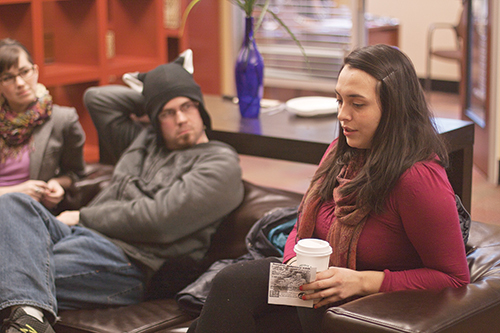Steven Balogh sat at the head of the eight students gathered on campus on Thursday. On the screen of his iPad were PowerPoint slides with words like “atheism,” “humanism” and “empiricism.”
Interfaith coalition connects students

Steven Balogh sat at the head of the eight students gathered on campus on Thursday. On the screen of his iPad were PowerPoint slides with words like “atheism,” “humanism” and “empiricism.”
Throughout Balogh’s presentation, the students, all members of the Portland State Interfaith Leadership Team, questioned the junior economics major about the philosophical differences between their beliefs and his own.
“Are there any, like, big philosophical distinctions within the different spheres of atheism?” asked Adam Bird, a psychology major.
“Yeah, but being an atheist doesn’t mean you are a liberal or say anything about your political identification,” Balogh answered. “There are moderates and extremists everywhere.”
It was a conversation that could have had a very different outcome had it taken place elsewhere and for different reasons. But it was par for the course for the interfaith group.
The Interfaith Leadership Team was founded in May 2011 in response to President Barack Obama’s Interfaith and Community Service Campus Challenge, which calls for organized groups of individuals from diverse faith backgrounds—both religious and not—to work together on service projects in their communities.
In addition to meeting each Thursday at 3 p.m. for discussions like Balogh’s, the team organizes days of service through a series of student-led committees.
Some of these committees, such as the one assembled for last year’s “Building Bridges” event, are designed to bring together people of diverse faiths for fellowship and dialogue. Others will take the team off-campus to assist groups such as Habitat for Humanity, for which they participated in an all-day house build.
It took the team some time to build up the personal infrastructure they have today. Rachel Samuelson oversees all the spiritual, international and linguistic student organizations through Student Activities and Leadership Programs, and helped organize the team.
“I got an email from some of the students I worked with, and they were like, ‘Yeah! Let’s do it!’” she said.
Initially, the team worked with Student Leaders for Service, and assisted with projects like the Martin Luther King Day of Service. Because the team’s mission is twofold—to increase campus engagement as well as perform community service—it took some time to find ways to blend the two into a working model.
“It was a little hard to make interfaith a component of those projects,” Samuelson said, referring to their earlier work with SLS. “We initially tried to do everything ourselves—event planning, working with outside groups. We weren’t meeting any of the goals we needed to meet for the challenge.”
Since 2011, however, the team has turned to the student-led committee model for organizing service projects, and has seen its membership double in size. Projects have grown from round-table discussions to working with outside groups to promote events such as Tuesday’s visit by Harvard Assistant Humanist Chaplain Chris Stedman to promote Faithiest, his book about interfaith work with nonreligious groups.
The team is not actually a registered student organization on campus, however. In order for the group to continue if, for example, Samuelson were to leave, they would need to become institutionalized through the university.
But the group’s recent success appears to have at least opened doors in that direction. Many of the students currently involved are also leaders of student groups for their individual faiths. Steven Balogh is the finance officer for Freethinkers of Portland State University. Maya Leon, president of the Modern Buddhist Student Association, also regularly attends meetings.
Samuelson was quick to note that the group’s weekly meetings are open to all, regardless of religious affiliation or campus involvement.
“It’s part of the wellness wheel,” she said. “We sometimes, especially at a public university, think we can’t talk about spirituality. But it is very important.”
And to Bird, who described himself as “abstractly spiritual,” the team fulfills a much deeper role than a weekly meet-up with fellow students for conversation.
“Personally, I feel that exploring others’ beliefs helps to enrich your own,” he said. “Diversity is what the universe wants.”




